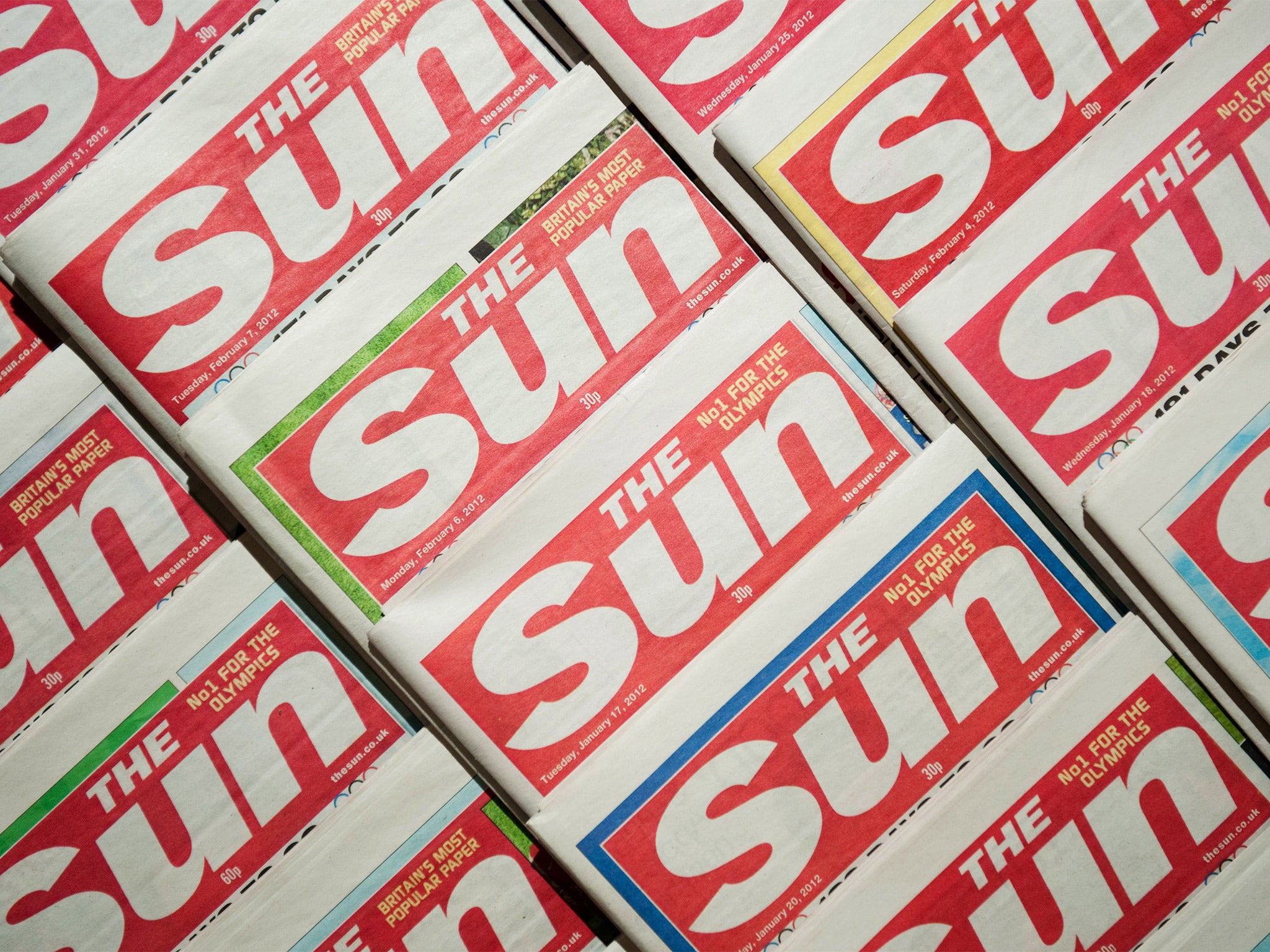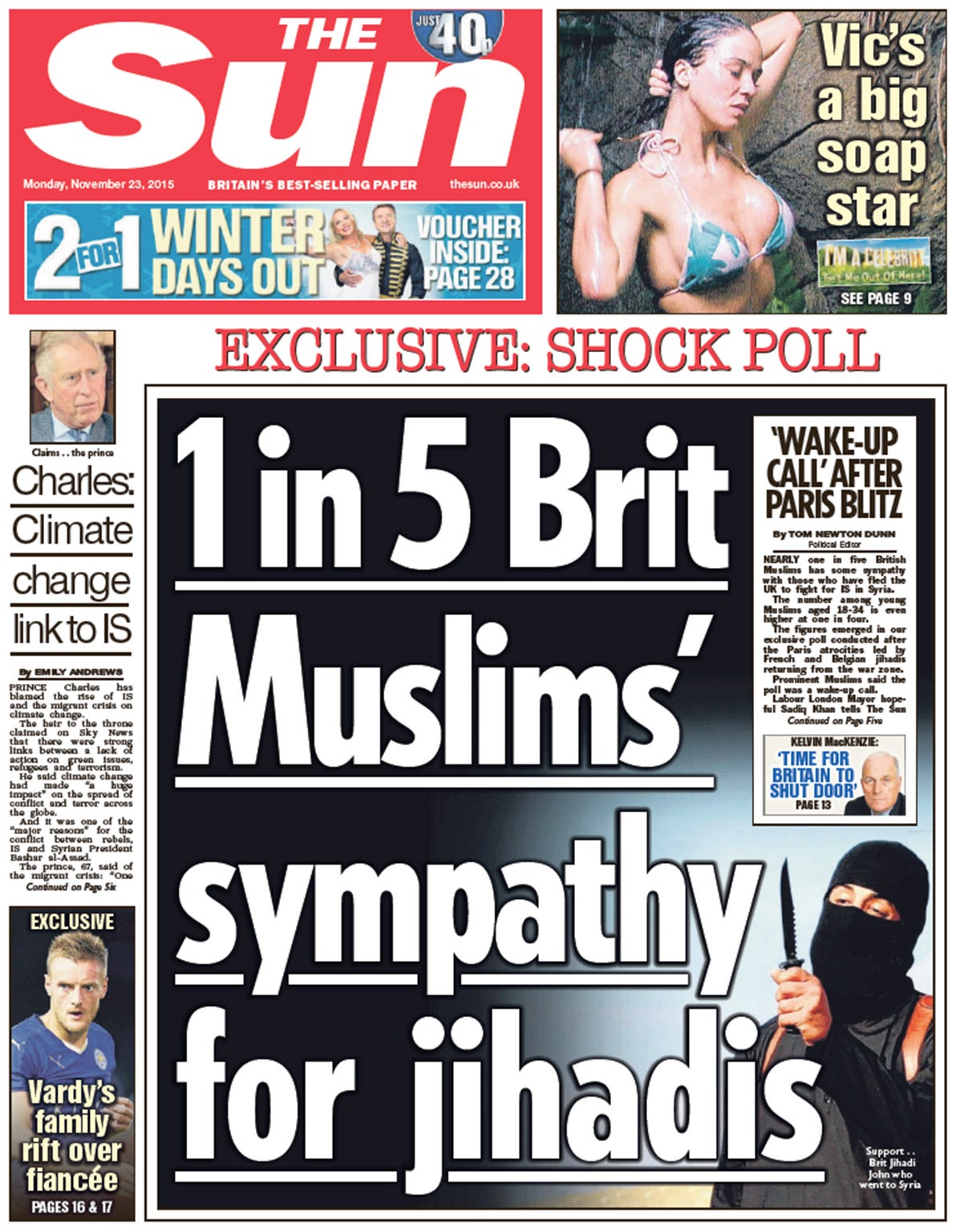The Sun's 'sympathy for jihadis' poll takes tabloid simplification too far
There are two key problems with Monday's "shock poll" - and against this background it seems rather less shocking

Your support helps us to tell the story
From reproductive rights to climate change to Big Tech, The Independent is on the ground when the story is developing. Whether it's investigating the financials of Elon Musk's pro-Trump PAC or producing our latest documentary, 'The A Word', which shines a light on the American women fighting for reproductive rights, we know how important it is to parse out the facts from the messaging.
At such a critical moment in US history, we need reporters on the ground. Your donation allows us to keep sending journalists to speak to both sides of the story.
The Independent is trusted by Americans across the entire political spectrum. And unlike many other quality news outlets, we choose not to lock Americans out of our reporting and analysis with paywalls. We believe quality journalism should be available to everyone, paid for by those who can afford it.
Your support makes all the difference.The Sun has come under fire this week for its coverage of a "shock poll", which according to its front page showed "1 in 5 Brit Muslims' sympathy for jihadis". Twitter came alive with anger, questions were raised about the poll's methodology and Survation, the company which carried out the survey, appeared to distance itself from the paper's presentation of the results.
With echoes of contentious tabloid splashes of the past, the latest controversy has revived debates about the potentially damaging impact of populist newspapers on public discourse.
It is certainly true that The Sun's interpretation of the poll requires scrutiny – although some of the criticisms have been as simplistic as The Sun's front page. For instance, claims that the survey was unrepresentative because it only questioned 1,000 people could apply to almost any opinion poll. Survation is a member of the British Polling Council and its methodology on this occasion was identical to a raft of similar polls in the past 12 months, none of which have caused such a hullaballoo.
The more fertile ground for querying the poll is to be found around the wording of the question which led to The Sun's striking assertion. Respondents were asked to say which of a number of statements was closest to their view as regards "young Muslims who leave the UK to join fighters in Syria": "I have a lot of sympathy with [them]"; "I have some sympathy…"; "I have no sympathy…"; or "Don't know". Some have noted that the question didn't specifically refer to Isis – but in the context of the other questions contained in the survey it seems unlikely that anyone would have concluded that they were not being asked about British Muslims fighting for that group.
Nonetheless, there are two key problems. The first relates to the definition of sympathy. Respondents were actually asked about their degree of sympathy "with" youngsters who have fled to fight in Syria (not "for" as The Sun's front page had it); but either way, it is a leap to conclude that sympathy amounts to support for their actions – or in Sun lingo: "backing for jihadis". It seems eminently plausible that at least some of those questioned thought they were expressing sorrow at the misfortune or misguidedness of young Muslims who had travelled to the killing fields.
Indeed, this leads to the second pitfall with the question, which is that it was only asked of British Muslims. As Survation made clear in a statement: "The most meaningful way to interpret the results of this polling is in the proper context alongside a comparable sample of non-Muslims." That is precisely what had been done in a survey by the same company back in March.
Then, the overall proportion of Muslims who expressed some degree of sympathy was actually rather higher, at 28 per cent. But strikingly, even among the non-Muslim population some 13 per cent said they had sympathy with those who had left Britain to join battle in Syria. Looking only at 18- to 34-year-olds, non-Muslims were more likely to express "a lot of sympathy" than Muslim respondents. Against this background, Monday's "shock poll" seems rather less shocking – and possible conclusions from it look considerably less clear-cut. The lack of a comparator might lead conspiracy theorists to believe The Sun was only ever interested in the kind of sensational headline it ended up with.

Even so, in the swirl of righteous indignation about The Sun's reporting, it has been little noted that the results of the poll are actually of interest. For those who got past the front page – or who did more than simply rage at its perceived shortcomings on Twitter – there was a double-page spread containing various tables and graphs showing, among other things, that the proportion of Muslims who feel it isn't important for British Muslims as a whole to integrate into British society was just 3 per cent – down from 6 per cent in March. The Sun also ran a reaction piece by Sadiq Khan, Labour's candidate to be London Mayor, examining the integration issue in light of the poll. These are reasonable matters for a newspaper to look at.
The fundamental question, therefore, must be one of presentation. Some elements of The Sun's coverage suggested it had drawn a conclusion from the poll which the results arguably do not sustain. And the sensational front page, showing the word "sympathy" next to a picture of knife-wielding Mohammed Emwazi (the image captioned "support… Brit Jihadi John who went to Syria") was badly judged at best. Maybe this highlights the perils of a tabloid splash – they can be things of genius but the margins for error are small.
Of course, the most interesting thing might be to know what Sun readers made of it all. Perhaps someone could commission a poll.
Will Gore's column 'The Only Way is Ethics' appears in the 'Independent' every Monday
Subscribe to Independent Premium to bookmark this article
Want to bookmark your favourite articles and stories to read or reference later? Start your Independent Premium subscription today.
Join our commenting forum
Join thought-provoking conversations, follow other Independent readers and see their replies
Comments